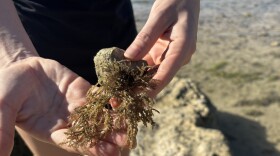-
Marine biologist Nicole Yamase and filmmaker Daniel Lin spoke to The Conversation's Catherine Cruz about the film "Remathau: People of the Ocean."
-
Researchers just reported that the most abundant species of invasive algae in the main Hawaiian Islands has been found in Papahānaumokuākea at Kuaihelani, or Midway Atoll.
-
At the first annual Hack-A-Thon contest to search for the next best marine debris cutting tool, seven contestants competed with their hand-made tools in front of a live audience and judge panel at the Waikīkī Aquarium.
-
Retired submarine pilot, Terry Kerby, spoke to The Conversationʻs Catherine Cruz about his marine art.
-
Rachel Cartwright of the Keiki Kohola Project spoke to HPR’s Maddie Bender about her research into the whales of Lahaina.
-
James Morioka and Derek LeVault, with the Papahānaumokuākea Marine Debris Project, spoke to The Conversation’s Catherine Cruz about the Marine Debris Hack-a-Thon 2025.
-
Hawaiʻi avoided the worst impacts of a recent marine heat wave in the North Pacific. But with marine heat waves occurring more frequently, it may not be long before the next major disaster strikes Hawaiʻi's coral reefs.
-
Kauaʻi Coral Restoration Nursery at Nōmilu Fishpond is the island's new and only coral nursery, housing its first coral specimens that will contribute to reef restoration and emergency response.
-
A Stanford University Ph.D. student from Molokaʻi is researching coral genetics in Maui Nui. As HPR's Catherine Cluett Pactol reports, his results could impact our understanding of reef health across Hawaiʻi.
-
University of Hawaiʻi scientists Aaron Judah and Jeff Drazen spoke with HPR’s Maddie Bender about their new research on the overlap between the habitats of sharks and rays and proposed commercial mining activities.
Play Live Radio
Next Up:
0:00
0:00
Available On Air Stations










